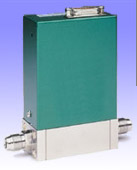
Mass Flow Controller
Encyclopedia

Fluid
In physics, a fluid is a substance that continually deforms under an applied shear stress. Fluids are a subset of the phases of matter and include liquids, gases, plasmas and, to some extent, plastic solids....
s and gas
Gas
Gas is one of the three classical states of matter . Near absolute zero, a substance exists as a solid. As heat is added to this substance it melts into a liquid at its melting point , boils into a gas at its boiling point, and if heated high enough would enter a plasma state in which the electrons...
es. A mass flow controller is designed and calibrated to control a specific type of fluid or gas at a particular range of flow rates. The MFC can be given a setpoint from 0 to 100% of its full scale range but is typically operated in the 10 to 90% of full scale where the best accuracy is achieved. The device will then control the rate of flow to the given setpoint. MFCs can be either analog
Analog signal
An analog or analogue signal is any continuous signal for which the time varying feature of the signal is a representation of some other time varying quantity, i.e., analogous to another time varying signal. It differs from a digital signal in terms of small fluctuations in the signal which are...
or digital
Digital
A digital system is a data technology that uses discrete values. By contrast, non-digital systems use a continuous range of values to represent information...
, a digital flow controller is usually able to control more than one type of fluid or gas whereas an analog controller is limited to the fluid (or gas) for which it was calibrated.
All mass flow controllers have an inlet port, an outlet port, a mass flow sensor and a proportional control valve. The MFC is fitted with a closed loop control system which is given an input signal by the operator (or an external circuit/computer) that it compares to the value from the mass flow sensor
Mass flow sensor
A mass air flow sensor is used to find out the mass flowrate of air entering a fuel-injected internal combustion engine. The air mass information is necessary for the engine control unit to balance and deliver the correct fuel mass to the engine. Air changes its density as it expands and contracts...
and adjusts the proportional valve accordingly to achieve the required flow. The flow rate is specified as a percentage of its calibrated full scale flow and is supplied to the MFC as a voltage signal.
Mass flow controllers require the supply gas to be within a specific pressure range. Low pressure will starve the MFC of gas and it may fail to achieve its setpoint. High pressure may cause erratic flow rates.
See also
- Thermal mass flow meterThermal mass flow meter-Introduction:There are two types of thermal flow meters in industry. Industrial thermal mass flow meters, also known as thermal dispersion or immersible mass flow meters comprise a family of instruments for the measurement of the total mass flow rate of a fluid, primarily gases, flowing through...
- Coriolis mass flow meterMass flow meterA mass flow meter, also known as an inertial flow meter is a device that measures mass flow rate of a fluid traveling through a tube. The mass flow rate is the mass of the fluid traveling past a fixed point per unit time....
- Flow limiterFlow limiterA flow limiter or flow restrictor is a device to restrict the flow of a fluid, in general a gas or a liquid. Some designs use single stage or multi stage orifice plates to handle high and low flow rates.-Uses:...
- Flow measurementFlow measurementFlow measurement is the quantification of bulk fluid movement. Flow can be measured in a variety of ways.Positive-displacement flow meters acumulate a fixed volume of fluid and then count the number of times the volume is filled to measure flow...
Video
- Capillary Thermal Principal: "Educational Video on Capillary Thermal Mass Flow ControllerMass Flow ControllerA mass flow controller is a device used to measure and control the flow of fluids and gases. A mass flow controller is designed and calibrated to control a specific type of fluid or gas at a particular range of flow rates...
Theory of Operation"

